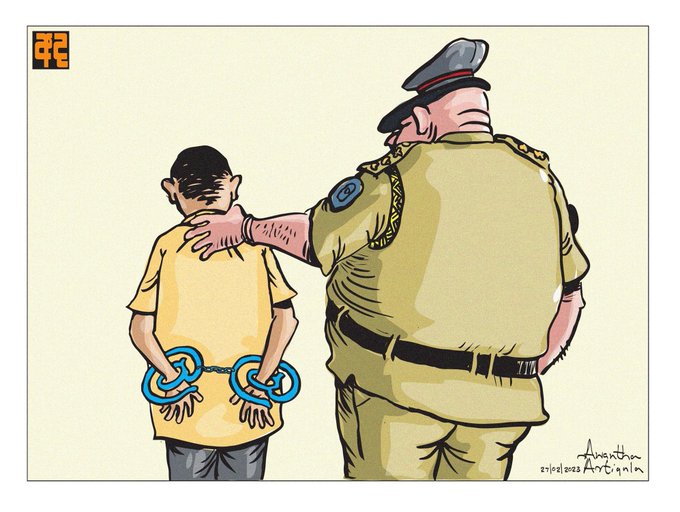We are a group of civil society organisations, human rights defenders and journalists who are alarmed by the recent statement[1] by President Ranil Wickremesinghe that the Sri Lankan Government is planning to introduce new laws to regulate social media platforms. We are concerned that ongoing efforts by the Government of Sri Lanka, including efforts purportedly aimed at regulating social media,[2] promoting ‘digital security’,[3] ‘curtailing online misinformation’,[4] ‘promoting media ethics’[5] and ‘promoting online safety’ might be used to advance ongoing efforts of surveillance and curtail the freedom of expression in the island.
According to media reports, a new law may be modelled on ‘Singapore’s Social Media Regulation Act’. Singapore’s Protection from Online Falsehoods and Manipulation Act (POFMA) has come under widespread criticism from human rights groups[6] for stifling freedom of expression in Singapore. According to the Freedom House Internet Freedom Index,[7] Internet freedom in Singapore has declined since the introduction of the law, as authorities have employed the POFMA to crack down on critical voices and censor a range of online material. Ahead of the July 2020 general elections in Singapore, the POFMA was also used against opposition politicians. Ordinary users continued to be investigated by Singaporean police and were criminally charged for the political and social content they posted, further reducing the space for free speech and the freedom of assembly online.
We recall also that Cabinet decisions from the meeting held on 22 August 2022[8] stated that ‘the Sri Lanka Computer Emergency Readiness Team (SLCERT) has drafted the information and cyber protection policy for state institutions …It is compulsory to implement this policy by all the state institutions defined as the “Public Authority: in the Right to Information Act No. 12 of 2016” [sic.]. However, Sri Lanka’s Right to Information Act includes private entities that perform public functions’ within the definition of ‘public authority’. Therefore, the announcement creates uncertainty as to whether non-state entities will also be required to comply with a cyber security policy, which has thus far not been published. While we understand that it is important to empower state bodies to maintain higher levels of digital security, we are concerned that the opacity and the lack of clarity surrounding legislation and policies may be used to stifle fundamental rights of citizens including the freedom of expression and citizen-led organisations including civil society organisations. We are deeply concerned about the total lack of public consultation during the drafting of these laws and policies. We believe that a transparent and accountable process of drafting should include consultation with all relevant stakeholders. We insist that such stakeholders should not only include technologists and state and non-state entities directly involved in technology development and regulation, but also those who may be impacted by these decisions, including but not limited to the media, youth and women’s groups, human rights defenders and civil society organisations.
A growing body of evidence[9] from the region and around the world shows that, in the hands of repressive states, laws purportedly aimed at ‘regulating social media’ and ‘promoting digital security’ could become tools of surveillance, repression and information control.
We recall that last year, the government announced plans to enact a new Obscene Publications Act with an eye on expanding the ambit of the existing Obscene Publications Ordinance to online spaces. However, following concerns raised by civil society groups, including by many of us, the government decided to withdraw the extraordinary gazette publication of the Bill, and announced that it will hold consultations with interested stakeholders. No consultations, that we are aware of, have been held thus far.
We further recall that the Annual Report of the United Nations High Commissioner for Human Rights on the situation of human rights in Sri Lanka, recommended that the
‘government ensures that the proposed regulation of social media protects freedom of peaceful assembly, association and expression’. We reaffirm the right to the freedoms of thought, and expression enshrined in article 10 and article 14 (1) (a) of the Sri Lankan Constitution[10] and remain committed to defending fundamental rights of Sri Lankans from all walks of life.
- Hashtag Generation
- Bakamoono.lk
- Climate Action Now Sri Lanka
- Grassrooted Trust
- National Peace Council
- Sisterhood Initiative
- Fr. Sherard Jayawardana
- Dr Paikiasothy Saravanamuttu, Executive Director, Centre for Policy Alternatives (CPA)
- Dr. Gehan Gunatilleke
- Anjali Wickramsinghe
- Benislos Thushan
- Darshatha Gamage
- Dulanjaya Mahagamage
- Hafsa Muheed
- Jayanthi Kuru-Utumpala
- Kiruthika Thurairajah
- Marisa De Silva
- Manjula Gajanayake, Executive Director, Institute for Democratic Reforms & Electoral Studies (IRES)
- Maneshka Borham
- Nalaka Gunawardene
- Naveen Rathnayake
- Nethmini Medawala
- Omar Rajarathnam
- Priskila Arulpragasam
- Raisa Wickramatunga
- Rosanna Flamer-Caldera
- Rebecca David
- Ruki Fernando
- Sampath Samarakoon
- Senel Wanniarachchi
- Shreen Saroor
- Sunanda Deshapriya
[1] http://www.adaderana.lk/news/87400/sri-lanka-to-introduce-new-laws-to-regulate-social-media
[2] https://www.newswire.lk/2023/01/07/regulating-social-media-president-reveals-opinion/
[3] https://www.dgi.gov.lk/news/cabinet-decisions/4160-cabinet-decisions-2022-08-22 [4]https://twitter.com/DeneththiSanath/status/1552208769563918337?s=20&t=xwVmRA6jHZTzHVcRI8NRgw https://www.newsfirst.lk/2022/02/20/its-important-to-introduce-social-media-ethics-state-minister/ [5]https://www.newsfirst.lk/2022/02/20/its-important-to-introduce-social-media-ethics-state-minister/
[6] https://www.hrw.org/news/2021/01/13/singapore-fake-news-law-curtails-speech
[7] https://freedomhouse.org/country/singapore/freedom-net/2020
[8] https://www.dgi.gov.lk/news/cabinet-decisions/4160-cabinet-decisions-2022-08-22
[9]https://twitter.com/amnestysasia/status/1437342248908120065?s=20&t=uZ2yAEEOU-sHIt7cMfvfww
[10] We also recall multiple international legal instruments including the Universal Declaration of Human Rights and the International Covenant of Civil and Political Rights
